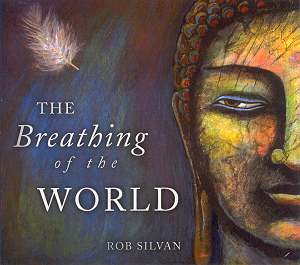Jazz pianist-composer Rob
Silvan’s latest offering is nothing if not
ambitious, attempting as it does musical settings
of psalms, the gnomic poetry of 13th
and 14th century Eastern mystics
and the works of 19th and 20th
century Western poets: T. S. Eliot, W. B.
Yeats and Emily Dickinson.
The subtitle of this collection
– Songs formed from the words of Sacred
Poetry – signals the musical idiom, a
moody mix of jazz and New Age spirituality,
and the performers’ personal responses to
the texts. And, although one might think it
a given in this context, Silvan says his aim
is to reveal the ‘essential wonder and beauty
of this poetry’.
The underpinnings of this
work are clearly jazz-inspired, with a hint
of blues and Gospel thrown in for good measure.
This eclectic approach is summed up in Silvan
own very broad definition of jazz as ‘an international
cross-blending of standards, current waves,
tropical styles, original composition and
improvisation and whatever else may come up
in the moment’.
Now that we know which of
his many hats Silvan is wearing here, how
does it all sound? Certainly rather different
to the bass-led, more bluesy pieces of earlier
albums, such as Eye of the Blackbird
and Beneath It All. In this new disc
Silvan appears to have modulated into an altogether
different key, finding a much more transparent,
intimate musical style, with instruments economically
deployed.
Occasionally the quasi-Eastern
flute and saxophone melodies seem a little
hackneyed (as does the vaguely Ravelian piano
intro to John Giuliani’s On This New Morning).
The flute does the imitative honours again
in the Dickinson setting, Hope Is the Thing
With Feathers; here, more than anywhere
else, one longs for some musical whimsy or
flash of humour to pierce the pall of earnestness.
Elsewhere the vocalists (singly
or in brief duets) have a more difficult job
to do in illuminating the texts. Michael Crouch
and Megan Sullivan share most of the singing,
the voices closely miked. Diction is generally
fine, although some listeners may baulk at
the Americanisms in the translations (‘quit’
and ‘gotten’). Not surprisingly at nodal points
in these pieces the vocalists signal the moments
of spiritual radiance (or, in the case of
the Hafiz and Rumi poems, ‘Sufi ecstasy’)
with repeated phrases (‘Hosanna, hosanna’,
and ‘Lift your foot. cross over’). This may
seem a rather crude device, albeit one familiar
to ascetics and visionaries, which has its
roots in the Gospel tradition. Silvan’s work
in this genre is best heard in the album You
are worthy of all God’s Love, recorded
with ‘his’ Talmadge Hill Community Church
choir.
An ambitious enterprise then,
but like so many collections of this nature
it suffers from a dearth of musical imagination.
Certainly there is a broad range of cultural
and musical traditions at work here but in
the rush to inclusiveness – even the cover
artwork seems indeterminate – none stands
out. Only occasionally, as in the Yeats setting
The Lake Isle of Innisfree, do the
music and words really take flight. Here,
suddenly, there is genuine engagement as the
music captures the authentic cadences of Celtic
folk poetry.
Of course one must not forget
Silvan’s contribution as pianist, reflective
and ecstatic by turns. But for all his skill
and intelligence as a performer there is still
a nagging doubt, that the piano’s limited
palette is reflected in the blandness of the
overall canvas. That said it is a disc directed
at a specific jazz/New Age/ambient audience
and is probably best auditioned with a glass
of Chardonnay in hand and the lights turned
low.
The disc is rather short
measure at a shade under 46 minutes. It comes
in a double gatefold case with the texts clearly
printed on four sides. The disadvantage is
that there is no room for biographical details
or background information about the music
and performers.
That said, those who want
to find out more about Mr Silvan’s many activities
as a teacher, music director, jobbing musician
and composer/ arranger, should check out his
website at: http://www.robsilvanmusic.com/
Dan Morgan
